
The entire writing process is fraught with perils.
Many writers would argue that the hardest part of writing is beginning. When asked what was the most frightening thing he had ever encountered, novelist Ernest Hemingway said, “A blank sheet of paper.”
 Other writers believe that ideas are easy, it’s in the execution of those ideas that the hard work really begins. You have to show up every day and slowly give shape to your ideas, trying to find just the right words, searching for the right turn of phrase, until it all morphs into something real. Then comes the wait to discover how your writing will be received. Chilean author Isabel Allende once said that writing a book is like putting a message in a bottle and throwing it in the ocean. You never know if it will reach any shores.
Other writers believe that ideas are easy, it’s in the execution of those ideas that the hard work really begins. You have to show up every day and slowly give shape to your ideas, trying to find just the right words, searching for the right turn of phrase, until it all morphs into something real. Then comes the wait to discover how your writing will be received. Chilean author Isabel Allende once said that writing a book is like putting a message in a bottle and throwing it in the ocean. You never know if it will reach any shores.
So just how do you go about facing an empty page, coaxing your ideas into the world of form, and steering the end result toward shore? You can start by studying the tips and advice from writers presented below.
Tips For Writers From Stephen King
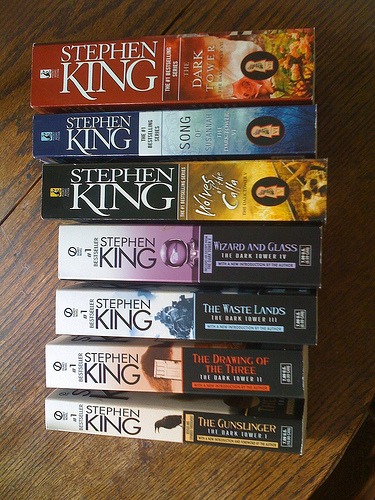 “If you want to be a writer,” says Stephen King , “you must do two things above all others: read a lot and write a lot.”
“If you want to be a writer,” says Stephen King , “you must do two things above all others: read a lot and write a lot.”
King, who has written over 50 books, emphasizes that writers have to be well-read. He adds that he has no patience for people who tell him that they want to be writers but they can’t find the time to read. The answer is simple: if you don’t read, you can’t be a writer. You have to read just about everything. In addition, you also have to write in order to develop your own style.
When it comes to the reading part of it, King explained during a lecture at Yale that if you read enough, there’s this magic moment which will always come to you if you want to be a writer. It’s the moment when you put down some book and say: “This really sucks . . . I can do better than this . . . And this guy got published.” So go ahead, read all you can, and wait for that magical moment. (Watch the YouTube video clip).
“On Writing”–published in 2000–is both a textbook for writers and a memoir of King’s life. Here’s an excerpt from “On Writing” in which King offers advice on pacing:
“Mostly when I think of pacing, I go back to Elmore Leonard, who explained it so perfectly by saying he just left out the boring parts. This suggests cutting to speed the pace, and that’s what most of us end up having to do (kill your darlings, kill your darlings, even when it breaks your egocentric little scribbler’s heart, kill your darlings)…I got a scribbled comment that changed the way I rewrote my fiction once and forever. Jotted below the machine-generated signature of the editor was this mot: “Not bad, but PUFFY. You need to revise for length. Formula: 2nd Draft = 1st Draft – 10%. Good luck.”
Tips For Writers From John Grisham
 John Grisham–a former lawyer best known for his legal thrillers–advices young writers to find their career, and adds that at first it won’t be writing. He explains that before you can be a writer you have to experience some things, see some of the world, go through things–love, heartbreak, and so on–, because you need to have something to say.
John Grisham–a former lawyer best known for his legal thrillers–advices young writers to find their career, and adds that at first it won’t be writing. He explains that before you can be a writer you have to experience some things, see some of the world, go through things–love, heartbreak, and so on–, because you need to have something to say.
You also need to have something to fall back on. Once you’re secure in life and you have a regular paycheck, then you can think about becoming a serious writer. (This is basically “The Survival/Sacred Dance” theory.)
He goes on to say that at first you have to treat writing as a hobby; you write a page a day in your spare time. Grisham explains that he created spare time to write, although he had a full time job. He adds that he always tells young aspiring writers that if they’re not writing a page a day, then nothing is going to happen. But if they make sure to write a page a day it becomes a habit, and before long they have a lot of pages piled up. (Source).
Tips For Writers From Erica Jong
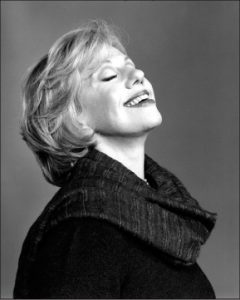 “The hardest part is believing in yourself at the notebook stage. It is like believing in dreams in the morning.” – Erica Jong
“The hardest part is believing in yourself at the notebook stage. It is like believing in dreams in the morning.” – Erica Jong
Erica Jong–who in “Seducing the Demon” defined a writer as “someone who takes the universal whore of language and turns her into a virgin again”, and who created compelling female characters such as Isadora Wing and Fanny Hackabout-Jones–tells us that she writes to get her life down on paper so that it can never be extinguished. She also writes to keep from going mad.
Jong admonishes aspiring writers not to expect approval for telling the truth, reminding them of Dante, Voltaire, Cervantes, and Swift. Then she adds: “Few are the great spirits who did not at one time or another write in jail, in exile, in the madhouse, or at the foot of the gallows.”
Tips For Writers From Ernest Hemingway
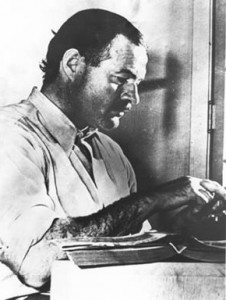
Ernest Hemingway–winner of the Nobel Prize in 1954–advices that each day’s work should only be interrupted when one knows where to begin again the next day. This helps the writer avoid the morning agony of facing the blank page. (From “Gabriel Garcia Marquez Meets Ernest Hemingway”).
Hemingway–knicknamed Papa–offers more invaluable writing tips in a rare interview he did with George Plimpton, original editor of “The Paris Review”, the magazine credited with inventing the modern literary interview. Here are some of the insights he offered during the inteview conducted in the Spring of 1958 (Source: “Conversations With Ernest Hemingway“):
Interviewer: How much rewriting do you do?
Hemingway: It depends, I re-wrote the ending to “Farewell to Arms”, the last page of it, thirty-nine times before I was satisfied.
Interviewer: Was there some technical problem there? What was it that had stumped you?
Hemingway: Getting the words right.
—————————————————-
Interviewer: Who would you say are your literary forebears, those you have learned the most from?
Hemingway: Mark Twain, Flaubert, Stendhal, Bach, Turgeniev, Tolstoi, Dostoevsky, Chekhov, Andrew Marvell, John Donne, Maupassant, the good Kipling, Thoreau, Captain Marryat, Shakespeare, Mozart, Quevedo, Dante, Virgil, Tintoretto . . . Goya, Giotto, Cezanne, Van Gogh . . . I put in painters, because I learn as much from painters about how to write as from writers . . . I should think what one learns from composers and from the study of harmony and counterpoint would be obvious.
——————————
Interviewer: Does the title come to you while you’re in the process of doing the story?
Hemingway: No, I make a list of titles after I’ve finished the story or the book–sometimes as many as 100. Then I start eliminating them, sometimes all of them.
————————————————-
If you enjoy reading writer interviews, The Paris Review’s Writers at Work interview series has elicited many of the most arresting, illuminating, and revealing discussions of life and craft from the greatest writers of our time. They’ve compiled their best interviews into three volumes: The Paris Review Interviews, I; The Paris Review Interviews, II; The Paris Review Interviews, III.
Tips For Writers From Kurt Vonnegut
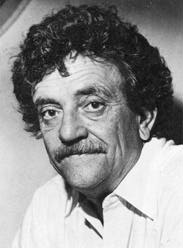 Kurt Vonnegut was a prolific American author known for works blending satire, black comedy and science fiction. He offers the following advice to aspiring writers: “Find a subject you care about and which you in your heart feel others should care about. It is this genuine caring, and not your games with language, which will be the most compelling and seductive element in your style.”
Kurt Vonnegut was a prolific American author known for works blending satire, black comedy and science fiction. He offers the following advice to aspiring writers: “Find a subject you care about and which you in your heart feel others should care about. It is this genuine caring, and not your games with language, which will be the most compelling and seductive element in your style.”
In the book “Bagombo Snuff Box”–an assortment of his short stories published in 1999, Vonnegut listed eight rules for writing a short story:
1. Use the time of a total stranger in such a way that he or she will not feel the time was wasted.
2. Give the reader at least one character he or she can root for.
3. Every character should want something, even if it is only a glass of water.
4. Every sentence must do one of two things-reveal character or advance the action.
5. Start as close to the end as possible.
6. Be a Sadist. No matter how sweet and innocent your leading characters, make awful things happen to them-in order that the reader may see what they are made of.
7. Write to please just one person. If you open a window and make love to the world, so to speak, your story will get pneumonia.
8. Give your readers as much information as possible as soon as possible. To hell with suspense. Readers should have such complete understanding of what is going on, where and why, that they could finish the story themselves, should cockroaches eat the last few pages.
Tips For Writers From Anne Lamott

Anne Lamott once received a rejection letter from an editor that said: “You have made the mistake of thinking that everything that has happened to you is interesting.” That, however, didn’t discourage her from writing; she’s the author of several successful novels as well as a book on writing, which a lot of people are familiar with, entitled “Bird by Bird”.
As for the title of her book, she explains that when her older brother was ten years old he was trying to write a report on birds which he’d had three months to write. The day before the report was due he was sitting at the kitchen table at the family’s cabin surrounded by unopened books on birds, immobilized by the huge task ahead of him. He was close to tears when his father walked up, put his arm around his shoulder, and said, ‘Bird by bird, buddy. Just take it bird by bird.’”
As can be expected from the book’s title, Lamott explains in “Bird by Bird” that the secret of writing is to get started, and in order to get started you need to break the complex, overwhelming task of writing into small manageable tasks. Then you simply get going with the first task.
From Lamott’s “Bird by Bird” comes her concept of “the shitty first draft”. Here’s an excerpt from “Bird by Bird” which explains that concept:
“For me and most of the other writers I know, writing is not rapturous. In fact, the only way I can get anything written at all is to write really, really shitty first drafts.
The first draft is the child’s draft, where you let it all pour out and then let it romp all over the place, knowing that no one is going to see it and that you can shape it later. You just let this childlike part of you channel whatever voices and visions come through and onto the page. If one of the characters wants to say, “Well, so what, Mr. Poopy Pants?,” you let her. No one is going to see it. If the kid wants to get into really sentimental, weepy, emotional territory, you let him. Just get it all down on paper, because there may be something great in those six crazy pages that you would never have gotten to by more rational, grown-up means. There may be something in the very last line of the very last paragraph on page six that you just love, that is so beautiful or wild that you now know what you’re supposed to be writing about, more or less, or in what direction you might go – but there was no way to get to this without first getting through the first five and a half pages.”
Here are three more writing tips found in “Bird by Bird”:
- “Almost all good writing begins with terrible first efforts. You need to start somewhere.”
- “Becoming a writer is about becoming conscious. When you’re conscious and writing from a place of insight and simplicity and real caring about the truth, you have the ability to throw the lights on for your reader. He or she will recognize his or her life and truth in what you say, in the pictures you have painted, and this decreases the terrible sense of isolation that we have all had too much of.”
- “This is our goal as writers, I think; to help others have this sense of–please forgive me–wonder, of seeing things anew, things that can catch us off guard, that break in on our small, bordered worlds. When this happens, everything feels more spacious. Try walking around with a child who’s going, “Wow, wow! Look at that dirty dog! Look at that burned-down house! Look at that red sky!” And the child points and you look, and you see, and you start going, “Wow! Look at that huge crazy hedge! Look at that teeny little baby! Look at the scary dark cloud!” I think this is how we are supposed to be in the world–present and in awe.”
Tips For Writers From Annie Dillard
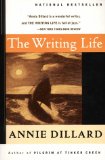
Annie Dillard has written eleven books, including “An American Childhood” and “Pilgrim at Tinker Creek”. In “The Writing Life” she goes into her life as a writer, and explains the ins and outs of what a writer needs to do to have a successful book.
Here are some gems from The Writing Life:
- “One of the few things I know about writing is this: spend it all, shoot it, play it, lose it, all, right away, every time. Do not hoard what seems good for a later place…. Something more will arise for later, something better.”
- “Write as if you were dying. At the same time, assume you write for an audience consisting solely of terminal patients. That is, after all, the case.”
- “It is no less difficult to write sentences in a recipe than sentences in Moby-Dick. So you might as well write Moby-Dick.”
- “When you write, you lay out a line of words. The line of words is a miner’s pick, a wood carver’s gouge, a surgeon’s probe. You wield it, and it digs a path you follow. Soon you find yourself deep in new territory. Is it a dead end, or have you located the real subject? You will know tomorrow, or this time next year.”
- “A work in progress quickly becomes feral. It reverts to a wild state overnight. . . it is a lion growing in strength. You must visit it every day and reassert your mastery over it. If you skip a day, you are, quite rightly, afraid to open the door to its room. You enter its room with bravura, holding a chair at the thing and shouting, ‘Simba!’”
Tips For Writers From Maya Angelou
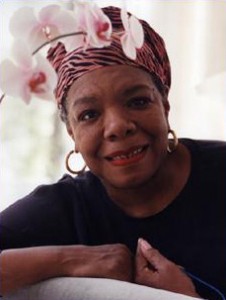 Maya Angelou is best known for her series of six autobiographies, which focus on her childhood and early adulthood experiences. In 1971 she was nominated for the Pulitzer Prize for her volume of poetry, “Just Give Me a Cool Drink of Water ‘Fore I Diiie.’”
Maya Angelou is best known for her series of six autobiographies, which focus on her childhood and early adulthood experiences. In 1971 she was nominated for the Pulitzer Prize for her volume of poetry, “Just Give Me a Cool Drink of Water ‘Fore I Diiie.’”
The following quote by Angelou is very reminiscent of Elizabeth Gilbert’s talk at Ted.com entitled “A Different Way to Think About Creative Genius”:
“What I try to do is write. I may write for two weeks ‘the cat sat on the mat, that is that, not a rat.’ And it might be just the most boring and awful stuff. But I try. When I’m writing, I write. And then it’s as if the muse is convinced that I’m serious and says, ‘Okay. Okay. I’ll come.’”
Beginning with “I Know Why the Caged Bird Sings”, Angelou has used the same writing ritual for many years (from: “Conversations With Maya Angelou”):
“When I’m writing . . . I get up at about five . . . I get in my car and drive off to a hotel room: I can’t write in my house, I take a hotel room and ask them to take everything off the walls so there’s me, the Bible, Roget’s Thesaurus and some good, dry cherry and I’m at work by 6:30. I write on the bed lying down–one elbow is darker than the other, really black from leaning on it–and I write in longhand on yellow pads. Once into it, all disbelief is suspended, it’s beautiful.”
Tips For Writers From Seth Godin
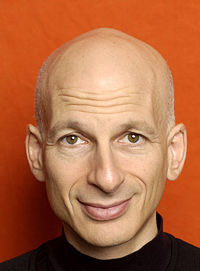 Seth Godin–marketing guru and best-selling author who’s been called “the ultimate entrepreneur for the Information Age”–generously offers nineteen pieces of advice for aspiring writers. Here are the first three pieces of advice:
Seth Godin–marketing guru and best-selling author who’s been called “the ultimate entrepreneur for the Information Age”–generously offers nineteen pieces of advice for aspiring writers. Here are the first three pieces of advice:
1. Lower your expectations. The happiest authors are the ones that don’t expect much.
2. The best time to start promoting your book is three years before it comes out. Three years to build a reputation, build a permission asset, build a blog, build a following, build credibility and build the connections you’ll need later.
3. Pay for an editor. Not just to fix the typos, but to actually make your ramblings into something that people will choose to read.
To read all 19 tips from Seth, visit his blog post “Advice For Authors”.
Seven More Tips For Writers, From Writers
Here are seven more tips from writers, for writers:
- William Stafford, explaining how he managed to be so prolific, said: “Every day I get up and look out the window, and something occurs to me. Something always occurs to me. And if it doesn’t, I just lower my standards.”
- Neal Bowers was told by his first creative writing teacher, Malcolm Glass, to “Trust the process and the reader.” His teacher also had a colorful metaphor of grabbing the tail of a wild hog as it runs by and letting it drag you through the thicket. Back when he first heard it, that metaphor didn’t help Neal much. However, he adds the following: “These days, though, I often look back at those unplanned and unpredictable trails my writing makes through the brush, with me hanging on, and I think of Malcolm’s wild hog. (Source).
- James Patterson’s method is simple: “I’m always pretending that I’m sitting across from somebody. I’m telling them a story, and I don’t want them to get up until it’s finished.” (Source).
- “The art of writing is the art of applying the seat of the pants to the seat of the chair.” — Mary Heaton Vorse
- “You don’t start out writing good stuff. You start out writing crap and thinking it’s good stuff, and then gradually you get better at it. That’s why I say one of the most valuable traits is persistence.” — Octavia Butler
- “If I waited for perfection, I would never write a word.” — Margaret Atwood
- “I constantly retype my own sentences. Every day I go back to page one and just retype what I have. It gets me into a rhythm.” — Joan Didion
Conclusion
Another common piece of advice from successful writers is to write about what you know. Hemingway was an avid hunter and fisherman–two activities which feature prominently in a lot of his writing–and he lived within walking distance of the fishing village in Cuba from which “Santiago” from “The Old Man and the Sea” hailed.
Isabel Allende–author of “The House of Spirits”–recalls that when she was growing up every Thursday there was a seance at her house, and that it was widely rumored that her clairvoyant grandmother could move objects with her mind. She adds that her family was very strange, and that she didn’t have to invent anything for her stories: everything was given to her. While the magical realism in her novels may be something new for the reader, Allende is simply writing from experience.
Want more writing tips? Here’s 350 of them.
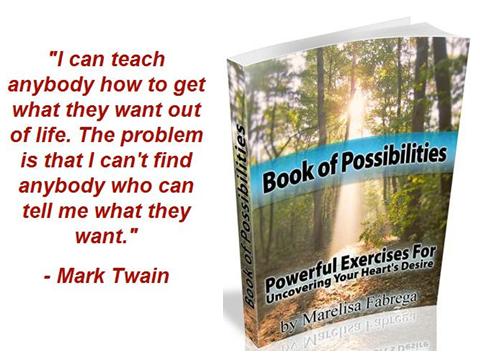
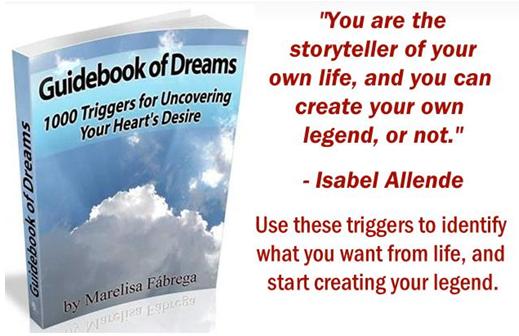
Related Posts:
- Ray Bradbury’s Best Writing Advice
- Creativity Tools: 24 Free Online Creative Thinking Tools
- 75 Creativity Quotes
- 119 Journal Prompts for Your Journal Jar
Did you enjoy this article? Subscribe to “Daring to Live Fully” by clicking here and get free updates.






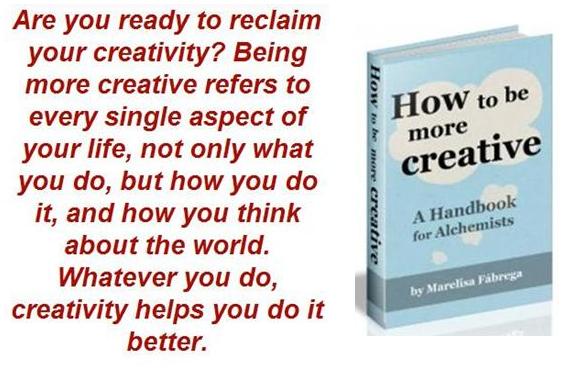
 Marelisa Fabrega is a lawyer and entrepreneur. She holds a Bachelor of Science in Business Administration from Georgetown University in Washington, D.C., as well as a Juris Doctor from the Georgetown University Law Center. You can learn more about her
Marelisa Fabrega is a lawyer and entrepreneur. She holds a Bachelor of Science in Business Administration from Georgetown University in Washington, D.C., as well as a Juris Doctor from the Georgetown University Law Center. You can learn more about her 






Comments on this entry are closed.
Superb post Meralisa! It definitely takes a lot of effort to compile tips from various writers. Kurt Vonnegut is one of my favourite writer that I really admired 🙂
I must admit not to knowing who Mary Heaton Vorse is, but the quotation attributed to her is usually attributed to Kingsley Amis–it’s one of his best-known bon mots.
Lovely article–useful and encouraging. Thanks!
Writers block is the worse thing in the world to a writer, it feels as if God has unplugged you from the mighty source and no matter what you do you fall merciless until He plugs you back in. How do you “make him” plug you back in. That is the answer every writer seeks at one point in their lives. When your plugged in you feel inspiration, ideas feel like they are implanted from the Heavens through an all mighty sieve that flows straight into your mind and when your unplugged you feel kicked out, doomed, branded as useless, like you did something wrong, not worthy or special no more. Your muse is unique to you, what crafts your story and when your purpose and time is right you will be plugged back in. A lady had a 10 year writers block and one day poof as if by magic, it appeared, the energy surged again, the wheels turned and the words flowed from Heaven, toher brain, fingersand finally to paper once again. Try it all, try all 57 tips and then try some more, do whatever you need to do to get your power back because trying is better then not trying at all, with one of the two your guaranteed to lose. No you can not fight fate but you can sure shape your destiny out of the experiences of your fate!
NAME* “a litter” lol, my laugh of the day. *A little
I very much enjoyed reading this. I was looking for something a little more technical as I’m new to the trade of writing, but I really appreciated Grisham’s comment about finding your place in life and living enough to have something to write about. Also, the quote about finding a “subject you care about” and want others to care about, was meaningful. The advice to pretend you’re seated in front of someone and telling them a story, and you don’t want them to rise till the end, is also wonderful. I am a musician and the technicalities can get in the way of the end product if you let them; no one wants to hear Chopin played with a metronome running, in other words. Or hear a computer play Beethoven. Keeping the heart, the intent, the message at the forefront in writing is no different. I often tell my students, “Think beyond the notes and the notes will work themselves out in the back of your mind.” I hate the term “writer’s block.” If you have something to say, say it. With all your heart, type-o’s, etc. Keeping one audience in mind is going to be my goal for the week, instead of trying to please the world and give my story “pneumonia.” Really, what a wealth of advice. Thank you, thank you!!
I am grateful for the one who shared this with us.Actually without you I am not able to know that i share a lot with such big writers.We have to start from somewhere and ya holding a book and start reading the preface is a creative start.I have written so many poems and stories as well as novels but still when I read the work of great writers sure I say I can be better but to be honest we haev to accept that we will reach a high stage one day 🙂
This has helped me so much. Reading advice from professionals makes me feel like I can become one. I’m only 13 but already I can write much better than some published authors. I find my writing peculiar compared to most published authors. I am curious to find out how that would effect my novels publishing possibility.
Im only 16. Reading lots and lots of stories and watching English movies, helped me day after day to become excellent in english language. I always wished to be a writer and my dream came to true. I have always listened my english teachers advice. I was worried to make a mistake… But i made the impossible things to let my dream vome true… If you need to be a succesful writer in any way u like, read as much as you can. And believe me nothing is imossible
These are great tips!
I am always wanting to write, but I have trouble with both ideas and with starting out.
This will help a lot,
Thank you!
First off I would like to say awesome blog! I had a quick question which I’d like to ask if you don’t mind.
I was curious to know how you center yourself and clear
your thoughts before writing. I’ve had a difficult time clearing my thoughts in getting my ideas out. I do take pleasure in writing however it just seems like the first 10 to 15 minutes tend to be wasted just trying to figure out how to begin. Any recommendations or hints? Many thanks!
Time is gone once putting your head down (or any other direction) to work on writing something. The other night I sat down at 8pm. By 2 am, I finally had a small paragraph. And I realize I might go back and change it a little, again. Could take 2 hours to have 2 lines! Just happens that way. But if you have a good idea and story, dont give up because eventually you’ll lay it all down the way you wished.
Lovely blog! It’s full of useful and inspirational messages.
One useful clue I heard a few years ago: Our leading resident (Australian) “Books and Writing” broadcaster, Romona Koval, was interviewing on her programme an elderly Canadian writer (who I think was Robertson Davies).
She asked him, “Who is your audience? Who do you write for?”
He replied, full of humour, good grace and an elongated last word, “Oh, that’s easy. I write for meeeee.”
Good advice, I think. Write what pleases you and there are enough people on the planet who will like the way you put words together.
Happy New Year!
This site was extremely helpful.
Can’t thank you enough
This is so inspiring! I would love to read more blogs like this one.